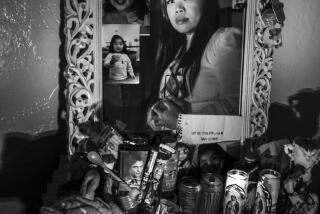NME Admits Responsibility in Girl’s Suicide : Health care: The company’s extraordinary acknowledgment is made in an out-of-court settlement.
- Share via
In an extraordinary admission of corporate responsibility, a National Medical Enterprises unit has acknowledged that it was responsible for the 1992 death of a 13-year-old girl who killed herself at a company-owned psychiatric facility in Chula Vista.
It is the first admission of responsibility in any of the nearly 150 lawsuits alleging physical mistreatment and abuse of patients that NME has faced since the late 1980s. The Santa Monica-based hospital firm has settled about 75% of those cases but had never admitted responsibility.
NME’s admission came in an out-of-court settlement reached Friday in a lawsuit filed in 1993 by Robert and Merry Scheck of San Diego, whose daughter, Christy, killed herself at Southwood Psychiatric Center.
“I’ve never seen (an admission of responsibility) before” in a medical negligence case, said Michael Coleman, a San Diego attorney who represented the Schecks. He said the admission was the key condition for the Schecks to accept a settlement and not pursue the case in court.
Financial terms of the settlement were not disclosed by either party. The case had been scheduled to go to trial in San Diego County Superior Court this week.
Richard Seltzer, an Oakland attorney who also represented the Schecks, would describe the settlement figure only as “a lot” of money.
Christy Scheck was an honors student and all-star soccer and baseball player at Horace Mann Middle School in East San Diego. In 1991, after the deaths of two family members and a teacher, she started “acting out,” the Schecks said. She ran away from home and was caught shoplifting. After she tried to slash her wrists, her parents admitted her to Southwood because they feared for her safety.
Four months after she was admitted, Christy used a bathrobe sash to hang herself at a Southwood facility. She died two days later.
In an interview last week, before the settlement, Seltzer said he was going to argue in court that Christy’s death was the result of negligence, mismanagement and “outrageous and despicable” conduct on the part of Southwood and Psychiatric Institutes of America.
“Our claim was that they were cutting back so much on costs to keep the stock price up that it created chaos in Southwood,” he said. The lawsuit contended that, to save money, the Southwood staff was made up largely of inexperienced and under-qualified workers, including part-time employees and student interns.
“They were obsessed with the profitability of each facility,” Seltzer said.
Robert Fairbank, a Los Angeles attorney representing NME, said Psychiatric Institutes began a cost-reduction program in 1991--about a year before Christy entered Southwood--in response to economic pressures in the mental health industry. “But we believe that her death was not affected in any way by the cost-containment program,” he said.
Last month, NME settled a federal fraud investigation of its psychiatric and substance abuse hospitals by paying $379 million in fines and restitution.
Of his family’s case, Robert Scheck, a career Navy enlistee, said: “There will never be a right (settlement) amount. There is no price that could take my daughter’s place. But in this way, a large company has taken the proper blame for a change.”
Said Merry Scheck: “We placed our daughter in their care for her safety. . . . (The settlement) gives a certain satisfaction--I’m not sure satisfaction is the right word--but it’s the closest I can come.”
In negotiating the deal, the Schecks insisted that the defendants--Southwood and Psychiatric Institutes of America, NME’s former psychiatric division--acknowledge their responsibility. The agreement also stipulates that the Schecks be allowed to talk about the case, other than the financial terms.
The decision to settle, NME attorney Fairbank said, had little to do with the company’s desire to avoid the unfavorable publicity of a trial or because NME feared losing the case. “We settled this case because we are accepting responsibility for this tragic incident,” he said.
More to Read
Sign up for Essential California
The most important California stories and recommendations in your inbox every morning.
You may occasionally receive promotional content from the Los Angeles Times.













